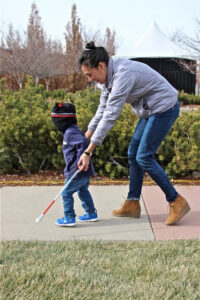
Meet our Experts
Elise Darrow
Manager of CVI Initiative
Teacher of Students with Visual Impairments, and Orientation & Mobility
Q: Tell me about your education background.
A: I received my Bachelor’s Degree at the University of Colorado at Boulder in Speech, Language, and Hearing Sciences. I received a master’s degree at the University of Northern Colorado to become a Teacher of Students with Visual Impairment (TSVI) and I am now back at the University of Northern Colorado pursuing my Ph.D!
Q: How did you get involved with the Anchor Center?
A: I knew Mindy, our Physical Therapist here at Anchor Center. I have an older sister who has multiple disabilities and Mindy has been her physical therapist since she was a baby. In fact, Mindy has known me since before I was born! My family has stayed in touch with Mindy over the years, and when she heard I was going to become a TSVI, she told me about a job opening at Anchor Center and I applied. I’ve been at Anchor Center since 2015.
Q: What are the high-points and challenges of your job?
A: I love working with young students who have visual impairments – it is such a unique opportunity to get to work with them when they are so young and we are able to set them up for so much potential. I also feel so lucky to have great coworkers who are my friends; this is definitely an aspect of my job that I don’t take for granted. I have recently been promoted to a new role for the Cortical Visual Impairment (CVI) Initiative and we are on the forefront of this groundbreaking work. It’s both exciting and nerve-wracking! How cool is it that I get to be a part of what was once a dream and make it become a reality, all in the name of helping our students better the use of their functional vision.
Q: What is the focus of this new role you are just starting?
A: As I work on this new initiative, the one thing I always come back to is how Anchor Center is making such a substantial impact in the field of visual impairment and this initiative’s impact will only increase going forward. We are collecting data on the recommendations of our teachers and therapists and implementing them at Anchor and in the homes of our students. We will document how their assessment-driven interventions are affecting the student’s development. We also want Anchor Center to be a one-stop-shop for providing resources when people want information regarding vision loss, CVI, conducting assessments, etc.
Q: What are the misconceptions about visual impairment?
A: That blindness means total darkness. Total blindness is very rare. In our preschool program that has 26 children, we only have two students right now who are totally blind. We have three or four other students that have very low vision, but they still have some light perception or color discrimination. While we are a center for the blind, we teach students who have low vision, total blindness and anywhere in between. We also emphasize the brain injury aspect of vision impairment. If someone has cortical visual impairment, the structure of their eyes could be fine, but there is damage to their brain that prevents them from processing visual images correctly.
Q: What is your favorite success story at Anchor?
A: Lunch time in preschool! I don’t think people understand that the act of eating and feeding oneself is a) very visual, b) takes repeated practice and c) requires conceptual understanding – especially when you have a visual impairment. I worked with a preschooler who was totally blind for 2-3 years and in his final semester at Anchor, he finally did the following steps independently: picked up the fork, scooped food onto the fork with assistance from his other hand, ate the food off the fork, and placed the fork BACK ON THE TABLE, NEXT TO HIS PLATE! Wow, once we had that down at lunch time, I celebrated every time I witnessed it. It may not have seemed like we were working on an intentional skill during lunch, but it really took this student that much time to master the skill. After all, it is our goal to send preschoolers off to kindergarten to be as independent as possible and that is not limited to getting from point A to point B independently…there is so much more to independence and that’s all in the details when we are working with our students.
